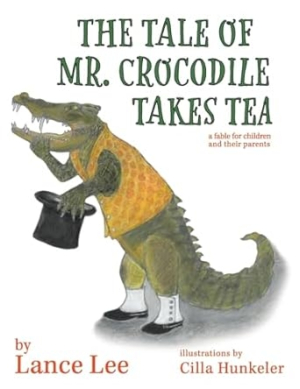The Tale of Mr. Crocodile Takes Tea
A Fable for Children and Their Parents
The Tale of Mr. Crocodile Takes Tea is a philosophical children’s book whose inquisitive hero models the value of asking probing questions.
In Lance Lee’s delightful children’s book The Tale of Mr. Crocodile Takes Tea, a crocodile decides to stand up, get dressed, and drink tea like a human.
When Kita tells fearsome Mr. Crocodile that he is a person in order to prevent the creature from attacking villagers, Mr. Crocodile decides the boy is right: He, too, deserves to be treated with dignity and respect. Proclaiming all crocodiles and African villagers “people,” Mr. Crocodile confronts an English hunter, convincing him to halt his capture of crocodiles for their skin. His conversation with the hunter makes him wonder whether the humans in England are people, too. Dressed to the nines, Mr. Crocodile travels to England in search of answers and discovers that there may be more to personhood than dressing up, talking, and taking tea.
Following Mr. Crocodile’s endless thirst for answers, including to the question of what else there is to do in the world besides “eating, swimming, [and] eating,” the story is moved forward by its hero’s engaging philosophical curiosity and expanding definition of personhood. At first, he regards those who can communicate as “persons”; later, that definition expands to those who exhibit empathy. Mr. Crocodile deems a kind, caged gnu a person before he acknowledges that the English are persons, his hesitancy driven by the harm he sees humans visiting on others. Indeed, the overarching message of treating other lifeforms “as absolute equals in everything” is clear. An inconsistency arises, though: Mr. Crocodile continues to eat salmon without questioning that choice.
The fabulistic narrative unites fantastical whimsy with recognized settings, bolstering the messaging and humor. Capitalized words contribute to an air of importance around the things Mr. Crocodile values, including “Person” and “High Tea.” The formal conversations between crocodiles and humans reflect a bygone age that’s mirrored in Mr. Crocodile’s choice of wearing an old-fashioned waistcoat. The book’s diametric language choices are amusing, as when the hunter “was about to ask how a Crocodile could know when it was 4 p.m. when a Tophat rose from the river.”
Illustrations of crocodiles in human clothes adorn each page, bringing additional lightness. The crocodiles’ lifelike proportions and striking of human poses bolster realism. Natural landscapes and cityscapes alike are rendered in intricate detail: Leafy trees are heavy with vibrant yellow fruit, and the motion of Londoners in the background, who are taken aback by a crocodile stepping off a double-decker bus, is dynamic.
The Tale of Mr. Crocodile Takes Tea is a charming children’s book in which a crocodile seeks commonalities between different animal species.
Reviewed by
Aimee Jodoin
Disclosure: This article is not an endorsement, but a review. The publisher of this book provided free copies of the book and paid a small fee to have their book reviewed by a professional reviewer. Foreword Reviews and Clarion Reviews make no guarantee that the publisher will receive a positive review. Foreword Magazine, Inc. is disclosing this in accordance with the Federal Trade Commission’s 16 CFR, Part 255.

